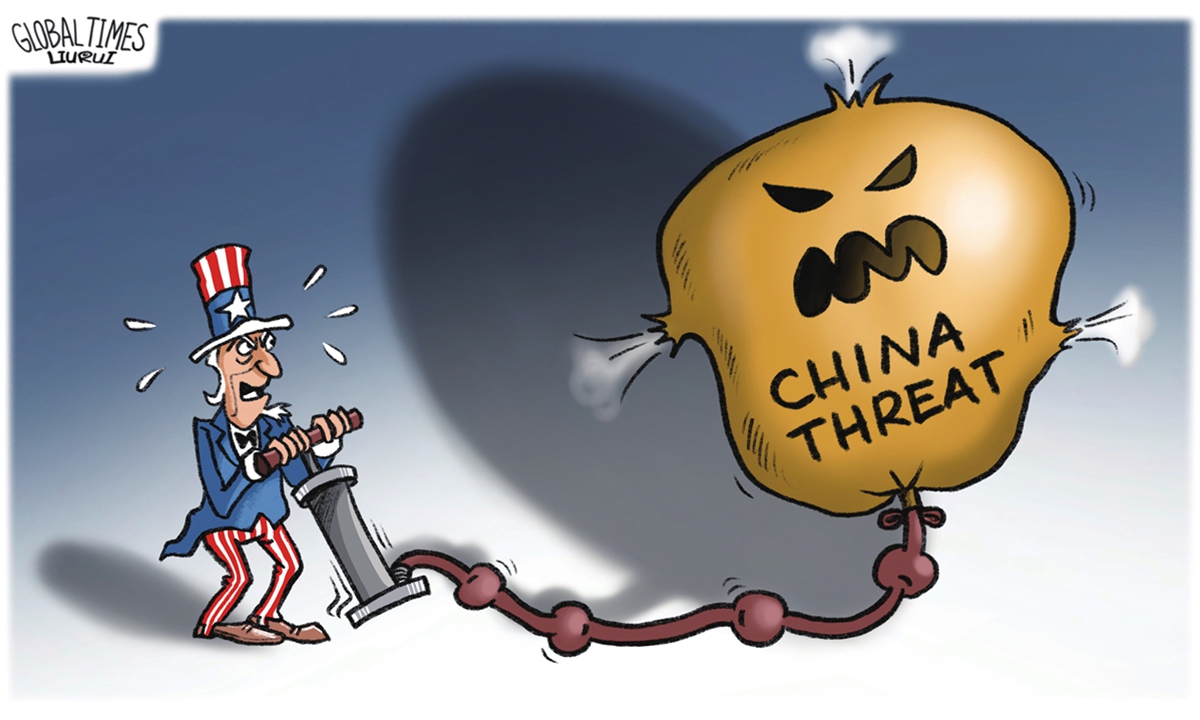How to Interpret Washington’s New Version of “Hacker Script”

Illustration: Liu Rui/GT
The director of the Federal Bureau of Investigation (FBI), Christopher Wray, made sensational remarks on Wednesday in Congress, elevating the “China threat theory” to a new level. He claimed that hackers associated with the Chinese government are “positioning on American infrastructure in preparation to wreak havoc and cause real-world harm to American citizens and communities.” Targets include water treatment plants, electrical infrastructure and oil and natural gas pipelines, he said. In response, Chinese Foreign Ministry Spokesperson Wang Wenbin explicitly stated that China firmly opposes and cracks down on all forms of cyberattacks in accordance with law. Without valid evident, the US jumped to an unwarranted conclusion and made groundless accusations against China. It is extremely irresponsible and is a complete distortion of facts.
On the same day, the US government added more than a dozen Chinese companies to a list created by the Defense Department to highlight firms it says are allegedly working with China’s military. US Secretary of Commerce, Gina Raimondo, exaggerated the potential national security risks posed by Chinese electric vehicles entering European market in talks with EU officials. From public opinion manipulation to actual actions, the US’ measures containing China were both intensive and frequent in recent days. The US once again unleashed a cold wind, at a time when communication and exchanges between high-level officials of China and the US have rapidly resumed since the beginning of 2024, and signs of stabilization in China-US relations have increased.
This has become an increasingly common phenomenon in China-US relations, reflecting the high complexity and uncertainty of US policy toward China and the depth of distortions in the US understanding of China. However, we also notice that Jake Sullivan, the national security advisor to the US president, in his latest remarks on China-US relations on January 30, while emphasizing the need for the US to strengthen its “competitive position,” also highlighted the importance of building stability, managing differences, and stressed the significance of maintaining communication and intensive diplomacy.
Taking a comprehensive view, US policy toward China is increasingly resembling a tightrope walk, with the key technique lying in maintaining balance. The US government is currently managing this with difficulty, and the challenge of maintaining balance is rapidly intensifying. The US clearly recognizes the serious consequences if balance cannot be upheld, but without timely adjustments, it is only a matter of time before it falls off the tightrope.
This year is the US presidential election year, and negative topics concerning China will be further magnified and intensified. However, aside from the election factors, people can see at a glance that the two ends of the “balance pole” between the US and China are gradually shifting, with the rational end toward China becoming shorter and the irrational end toward China becoming longer. One major manifestation is the continuous innovation and upgrading of the “China threat theory,” which has contaminated the decision-making atmosphere and environment toward China, resulting in an increasingly imbalanced US policy toward China, even to the extent of losing control. This poses a significant risk for the US, the Asia-Pacific region, and the world.
Why do American officials and politicians like Christopher Wray work so hard to create and spread the “China threat theory”? The reasons are multifaceted. For example, the most common occasions are often in the US Congress, both because Congress has become a gathering place for anti-China politicians and because Congress controls the purse strings. Using the “China threat” as a gimmick is the best way to secure funding. Additionally, some individuals project their inner world onto China. There are also those who have developed a delusion about China, where anything related to the word “China” becomes a “terrifying monster” that must be guarded against. This is a result of extreme lack of confidence, anxiety, and even delusion in the face of China’s rapid development.
Also on January 31, the Senate Judiciary Committee hosted a hearing titled “Big Tech and the Online Child Sexual Exploitation Crisis.” The chief executives of five major social media giants, including TikTok CEO Shou Zi Chew attended to testify. Although the meeting had a predetermined theme and many attendees, Chew once again became the focus. Many senators bypassed the main topic and questioned Chew about his relationship with China. Republican Senator Tom Cotton even aggressively questioned Chew’s citizenship with eight questions. It is well known that Chew is from Singapore. Even netizens on X platform couldn’t stand it and condemned Cotton for his “xenophobia” and “blatant racism.” Isn’t this a microcosm of Washington politicians?
It is evident that the US authorities have the intention to use anti-China rhetoric and need a strategic imaginary enemy or scapegoat in Washington politics. However, this is feeding a monster with malice and hostility toward China. The monster is growing day by day, with an increasing appetite and becoming more cunning. In the past, stories about “Chinese hackers” could satisfy it for a while, but now the story has to be escalated to the level of threatening all Americans. When this monster breaks free, its first target will be the US itself.
Global Times, where this article was first published, takes great pains to present facts and views that could help the readers better understand China. Read other articles by Global Times, or visit Global Times's website.
No comments:
Post a Comment